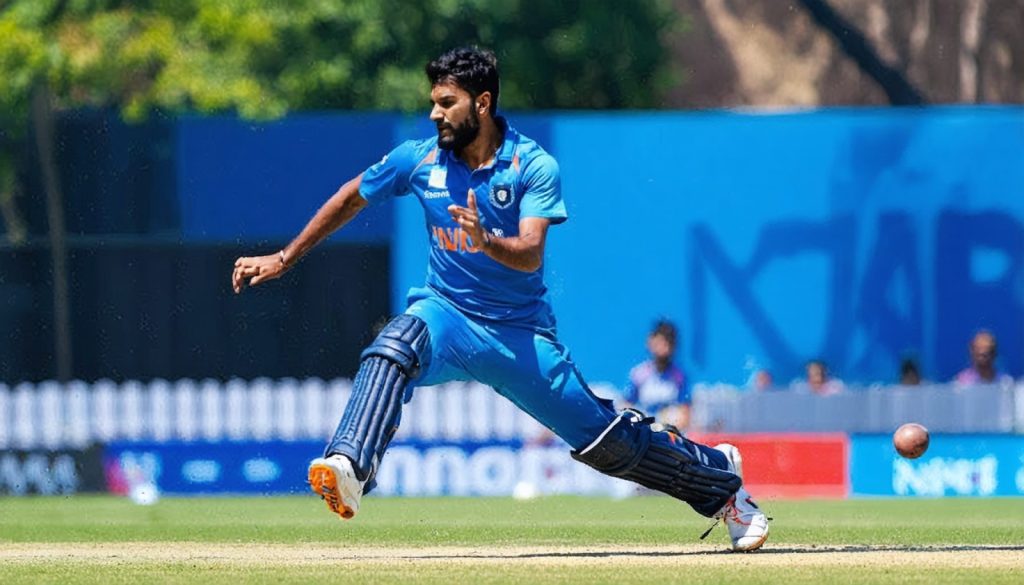
- The World Audio Visual & Entertainment Summit 2025 highlighted sports, especially fantasy sports, as a key driver for India’s AI ambitions.
- Professor Vishal Misra from Columbia University suggests leveraging massive datasets from fantasy sports to train advanced AI models.
- India aims for a $500 billion GDP boost via AI by 2025, with sports proposed as a fourth pillar alongside healthcare, agriculture, and smart cities.
- A national sports data repository and AI sports innovation hubs are proposed to usher in AI advancements.
- The FIFS Sports Data Gameathon showcases potential AI applications developed by students using sports data.
- Sports, traditionally seen as entertainment, can evolve through AI to enhance athlete performance and fan engagement.
- By 2030, AI could contribute 15% to India’s economy, with sports playing a critical role in this growth.
In the bustling crossroads of technology and competition, a visionary white paper unveiled at the World Audio Visual & Entertainment Summit 2025 proposes an unexpected ally in India’s AI ambitions: sports. This is not merely a call to action but a blueprint for transformation authored by Professor Vishal Misra of Columbia University, suggesting that sports, particularly the flourishing fantasy sports platforms, could be the key to propelling India’s artificial intelligence development.
Visualize stadiums not as mere arenas of athletic prowess but as sprawling laboratories of data, each play, pass, and strategy charted in the language of bits and bytes. Dreams of AI advancement fuel the imagination as platforms like Dream11—home to a staggering 250 million users—amass colossal datasets ripe for training cutting-edge AI models. Here lie opportunities to cultivate a generation of tech-savvy talent and broaden the horizons of AI applications across myriad sectors.
India stands poised with a bold vision: a $500 billion GDP surge driven by AI by 2025. Yet, healthcare, agriculture, and smart cities lead the mission, overlooking the untapped potential of sports. Misra’s study challenges this oversight by envisioning sports as the fourth pillar of the IndiaAI Mission. By establishing a national sports data repository, carving out AI sports innovation hubs, and designing specialized curricula for academic institutions, the proposal sets the stage for profound advancements. The pioneering FIFS Sports Data Gameathon has already demonstrated how merging data with student ingenuity can spawn innovative applications, proving that AI potential lies beyond traditional domains.
Beyond being mere entertainment, fantasy sports offer a democratic platform where AI can thrive. Imagine a world where athlete performance is enhanced by real-time data analytics, where fans engage through immersive technologies, and where strategic decisions are crafted with precision by leveraging advanced AI models.
An exciting journey beckons, urging policymakers to seize this opportunity. As we look toward 2030, with projections of AI contributing a hefty 15% to India’s economy, sports—once an unlikely candidate—may emerge as the country’s secret weapon in the AI race. Embracing this vision could not only redefine how we perceive sport but also revolutionize the technological fabric of the nation.
The Surprising Role of Sports in Shaping India’s AI Future
Overview
In a groundbreaking proposal unveiled at the World Audio Visual & Entertainment Summit 2025, sports have been positioned as a catalyst for India’s burgeoning AI ambitions. Authored by Professor Vishal Misra from Columbia University, this visionary white paper posits that sports—particularly the vast data reservoirs generated by fantasy sports platforms like Dream11—could be the unexpected driver of India’s AI advancement.
Why Sports and AI?
The proposal challenges conventional priorities in the AI landscape, where healthcare, agriculture, and smart cities have traditionally dominated the discourse. Here’s what we miss by not integrating sports into this narrative:
1. Data-Rich Environments: Stadiums serve as rich data environments. Every play, strategy, and fan interaction generates data that AI models can analyze for insights beyond sports.
2. Mass Engagement: With 250 million users on Dream11 alone, fantasy sports offer vast amounts of user-generated data, which is critical for training AI systems and deriving predictive models.
Potential Impact
– GDP Growth: India aims for a $500 billion GDP boost by 2025 through AI. Acknowledging sports’ potential could significantly contribute to this target.
– Cultural Shift: Incorporating sports into AI development can foster a tech-savvy culture and pave the way for innovations in fan engagement and athletic performance.
Real-World Use Cases
– Athlete Performance: Real-time analytics can enhance player training regimens and game strategies.
– Fan Engagement: Immersive experiences powered by AI can revolutionize how fans interact with sports.
– Strategic Decision-Making: AI can assist coaches and managers in making precise, data-driven decisions.
Industry Trends
The AI and sports synergy is anticipated to align with several emerging trends by 2030:
– 15% Economic Contribution: AI is projected to contribute significantly to India’s economy, with sports playing a pivotal role.
– AI Innovation Hubs: Establishing AI sports innovation centers can create ecosystems that nurture cutting-edge tech solutions.
Security & Sustainability
– Data Privacy: Ensuring robust data privacy measures is crucial. With vast amounts of personal and strategic data, safeguarding against breaches is paramount.
– Sustainable Development: Utilizing AI in sports can lead to more efficient resource management, such as energy usage in stadiums.
Actionable Recommendations
1. Public-Private Partnerships: Foster collaboration between government, educational institutions, and private sectors to develop sports as an AI pillar.
2. Curriculum Design: Implement specialized AI and sports curricula to prepare the next generation of innovators.
3. National Sports Data Repository: Create comprehensive data sets that can drive AI solutions in sports and beyond.
Conclusion
As India strides toward realizing its AI potential, policymakers and stakeholders should incorporate sports as a strategic focus. Not only does it promise an economic windfall, but it also stands to transform the cultural and technological landscape. Embrace this vision to redefine sports and AI in India fundamentally.
For more information on AI and sports developments, visit the official [NASSCOM](https://www.nasscom.in/) and [Dream11](https://www.dream11.com/) websites.



